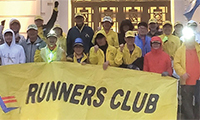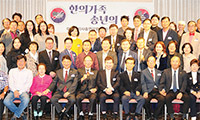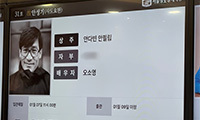Slain Civilians Counted As Rebels in Colombia

Blanca Monroy held a picture of her son Julian Oviedo, a laborer killed by Colombian soldiers. The army called him a subversive.
By SIMON ROMEROSOACHA, Colombia - Julian Oviedo, a 19-year-old construction worker in this gritty patchwork of slums, told his mother on March 2 that he was going to talk to someone about a job offer. A day later, he was shot dead by army troops some 563 kilometers to the north. He was classified as a subversive and registered as a combat kill.
Colombia’s government, the Bush administration’s top ally in Latin America, has been buffeted by the killings of Mr. Oviedo and dozens of other young, impoverished men and women . Some were vagrants, others street vendors or manual laborers. But their fates were often the same: being catalogued as insurgents or criminal gang members and killed by the armed forces.
Prosecutors and human rights researchers are investigating hundreds of such deaths and disappearances, contending that Colombia’s security forces are increasingly killing civilians and making it look as if they died in combat, often by planting weapons by the bodies or dressing them in guerrilla fatigues. With soldiers under intense pressure to register combat kills to earn promotions and benefits , reports of civilian killings are climbing, prosecutors and researchers say.
The deaths call into question the depth of the military’s recent gains against the rebel Revolutionary Armed Forces of Colombia, or FARC.
President Alvaro Uribe’s government announced in October that it had fired more than two dozen officers and soldiers, including three generals, in connection with the deaths of Mr. Oviedo and 10 other men from Soacha . On November 4, the commander of Colombia’s army, General Mario Montoya, resigned.
Mr. Oviedo’s mother, Blanca Monroy, discussed her son’s death in an interview in her cinder-block hovel in Soacha. “If the responsibility of the army is to protect us from harm, how could they have killed my son this way?” asked Ms. Monroy, 49. “The official explanation is absurd, if he was here just a day earlier living a normal life.”
The wave of killings has heightened focus on the American Embassy here, which is responsible for screening Colombian military units for human rights abuses before they can receive United States aid. A study by the human rights groups Amnesty International and Fellowship of Reconciliation found that 47 percent of the civilian killings reported in 2007 involved Colombian units financed by the United States.
A senior official at the American Embassy said the reports of civilian killings were of concern. “If the facts in some cases do show that parts of the armed forces were taking part in murder, that’s wrong, and there should be mechanisms to prevent this from happening and mechanisms to ensure that perpetrators are brought to justice,” said the official, who was not authorized to speak publicly on the matter.
Even before the most recent cases, prosecutors and human rights groups were examining a steady increase in the reports of civilian killings since 2002. The increase spurred the Defense Ministry to issue a directive last year making it a priority to capture rebels rather than kill them.
Until the latest wave of killings, it appeared that the new policy was starting to work. But the spate of cases in Soacha and elsewhere suggests that the problem may be more systemic than once thought.
In some cases, victims’ families spoke of middlemen who had recruited their loved ones with vague promises of jobs elsewhere, only to deliver them to war zones where they were shot dead by soldiers.
One morning in April 2004, soldiers approached the home of Juan de Jesus Rendon, 33, a peasant farmer in Antioquia Department, and shot him in front of his son, Juan Esteban, who was then 10.
The soldiers placed a two-way radio and a gun near Mr. Rendon’s body, court records show, and told his son that his siblings would suffer the same fate unless he said his father had fired at the soldiers.
The five soldiers involved were convicted of homicide . The case is one of a small number - fewer than 50 - that have resulted in convictions this decade.
“I still fear this can happen again.” Vilma Garcia, 35, Mr. Rendon’s widow, said in an interview. “The soldiers think we are poor and worthless, so nobody will care how we are killed.
스마터리빙
more [ 건강]
[ 건강]이제 혈관 건강도 챙기자!
[현대해운]우리 눈에 보이지 않기 때문에 혈관 건강을 챙기는 것은 결코 쉽지 않은데요. 여러분은 혈관 건강을 유지하기 위해 어떤 노력을 하시나요?
 [ 건강]
[ 건강]내 몸이 건강해지는 과일궁합
 [ 라이프]
[ 라이프]벌레야 물럿거라! 천연 해충제 만들기
 [ 건강]
[ 건강]혈압 낮추는데 좋은 식품
[현대해운]혈관 건강은 주로 노화가 진행되면서 지켜야 할 문제라고 인식되어 왔습니다. 최근 생활 패턴과 식생활의 변화로 혈관의 노화 진행이 빨라지고
사람·사람들
more
LA 러너스클럽 새해맞이 등반 행사
LA 러너스클럽(회장 대니얼 임)은 지난 1일 새해맞이 그리피스팍 등반 행사를 가졌다. 이날 회원 30여 명은 쏟아지는 비 속에서도 그리피스팍…

미주한의사총연 송년행사
미주한의사총연합회(회장 조본환·이사장 서영수) 송년회가 지난달 14일 LA 옥스포드 팔레스 호텔에서 열렸다. 이날 행사에서는 프란시스코 김 캘…
[인터뷰-문경환 한인회장] “캔자스, 이민자들에 … 1
“캔자스시티는 삶의 속도와 기회의 균형이 잘 맞는 도시입니다. 제2의 인생을 시작하기에 더없이 좋은 곳이죠.”29일 본보를 방문한 문경환(61…
일사회 창립 14주년 기념식 및 송년행사
전·현직 민주평통자문위원들의 모임인 일사회(회장 박철웅)는 지난 16일 용수산에서 창립 14주년 기념식 및 송년회를 개최했다. 이날 행사에는 …
LA평통 통일전략분과 상견례
LA 평통(회장 장병우) 통일전략분과(위원장 이정현)는 지난 27일 형제갈비에서 상견례 겸 간담회를 개최했다. 이날 모임에서는 위원 간 교류를…
많이 본 기사
- 조용필 한달음에..故 안성기 빈소, 박중훈→이정재 조문 행렬
- 마두로 축출에 갈라진 지구촌… “국제법 위반” vs “환영”
- 캘리포니아 ‘직장 내 권리 알림법’ 시행 돌입
- [마두로 체포 막전막후] ‘델타포스’ 침투 5분만에 전광석화 체포… 은신처 대피 못해
- 가주 DMV 리얼 ID 발급 ‘전산 오류’
- ‘대상’ 이상민 잘나가니 발끈..’성범죄자’ 고영욱→ ‘도박’ 신정환, 번갈아가며 저격
- 트럼프, 베네수엘라 전격 군사작전… 마두로 ‘축출’
- LAX 또 항공편 대거 취소·지연 사태
- [이민법 칼럼] 시민권 박탈
- 연방 항소법원 “총기 공개적 휴대 금지 가주법 위헌”
- 마두로 전격 체포 뒤엔 ‘스텔스 드론·밀정’ 있었다
- 루비오 국무, ‘베네수엘라 총독’ 되나
- [신년 집중기획/2026 새해 이렇게 바뀐다] 이민 제도 5대 변화… 영주권자까지도 입국시 안면인식 생체정보 수집
- BTS 정국, ‘접근금지’ 요청했지만..브라질女 집 찾아가 난동 ‘검거’
- 박지성♥김민지, 새해 근황..훌쩍 큰 딸·아들 공개
- ‘국민 배우’ 안성기 별세 혈액암 투병, 향년 74세
- 입국 제한 확대… 추가 20개국 이민 신청 전면 중단
- 정보석, 故이순재 이어 故안성기까지.. “또 한 분의 큰 스승 편히 가세요”
- 가주, 개인정보 보호법 ‘초강수’
- 메디케이드 정보 이민국 공유 ‘허용’
- 한인타운 인근 상가서 묻지마 총격 2명 사상
- “트럼프 폭주… 달러 패권 흔들”
- 스마트폰·SNS 조기 노출… 청소년의 뇌가 위험하다
- Crinks 세력이 크게 꺾이는 그런 해가…
- 베네수엘라 권한대행, 미국에 ‘협력’ 제안… “존중하는 관계로”
- [한인 은행·업체 시무식 화보] “붉은 말 기운받고 한인 경제 도약에 기여하자”
- 트럼프, 베네수엘라 전격 군사작전… 마두로 ‘축출’
- 하늘길 막은 ‘불청객’… 인천공항 운항 피해 5년새 107건
- [美 마두로 축출] 뉴욕 구치소 수감된 마두로… “좋은 밤이에요” 인사도
- 재정보조만으로 부족한 대학 학비… 장학금 신청으로 해결
- 중가주 ‘한인 이민사’ 나왔다
- 황희찬 ‘PK 1골+1도움’… 울버햄프턴, 개막 20경기 만에 첫 승
- 시간이 머무는 곳
- [데이빗 이그나티우스 칼럼] 신년맞이 퀴즈: 2026년에는 좋은 일이 있을까?
- “올해도 미 성장 지속… S&P 500 두 자릿수↑”
- 이부진 호텔신라 사장 NBA 중계화면에…아들과 함께 미국서 휴가
- 60년 만 ‘투자 귀재’ 없는 첫 주
- 베네수엘라, 세계 최대 매장량이라는데…국제유가도 영향받나
- [부음] 오동균 장로
- “경찰관 노고에 진심으로 감사해요”
- [만화경] 집권 2년 차 징크스
- ‘브라운 50점’ 보스턴, 클리퍼스 꺾고 3연승
- ‘길잃은’ 中 중남미정책…일대일로에 직격탄
- 30년 모기지, 최저치 6.15%로 지난해 마감
- 오픈AI, 직원 주식보상도 ‘역대급’
- LA 총영사관 시무식… “민원 서비스 강화”
- 현대차·기아·제네시스… 2025년 판매 역대 최다
- 지표 보면 경제 알 수 있다… 경기 향방 가늠 10대 지표
- 가주 ‘억만장자세’ 추진… 파문 확산
- ‘케데헌’, 크리틱스초이스 애니메이션상·주제가상 2관왕
1/5지식톡

-
 미 육군 사관학교 West Poin…
0
미 육군 사관학교 West Poin…
0https://youtu.be/SxD8cEhNV6Q연락처:wpkapca@gmail.comJohn Choi: 714-716-6414West Point 합격증을 받으셨나요?미 육군사관학교 West Point 학부모 모…
-
 ☝️해외에서도 가능한 한국어 선생님…
0
☝️해외에서도 가능한 한국어 선생님…
0이 영상 하나면 충분합니다!♥️상담신청문의♥️☝️ 문의 폭주로 '선착순 상담'만 진행합니다.☎️ : 02-6213-9094✨카카오톡ID : @GOODEDU77 (@골뱅이 꼭 붙여주셔야합니다…
-
 테슬라 자동차 시트커버 장착
0
테슬라 자동차 시트커버 장착
0테슬라 시트커버, 사놓고 아직 못 씌우셨죠?장착이 생각보다 쉽지 않습니다.20년 경력 전문가에게 맡기세요 — 깔끔하고 딱 맞게 장착해드립니다!장착비용:앞좌석: $40뒷좌석: $60앞·뒷좌석 …
-
 식당용 부탄가스
0
식당용 부탄가스
0식당용 부탄가스 홀세일 합니다 로스앤젤레스 다운타운 픽업 가능 안녕 하세요?강아지 & 고양이 모든 애완동물 / 반려동물 식품 & 모든 애완동물/반려동물 관련 제품들 전문적으로 홀세일/취급하는 회사 입니다 100% …
-
 ACSL 국제 컴퓨터 과학 대회, …
0
ACSL 국제 컴퓨터 과학 대회, …
0웹사이트 : www.eduspot.co.kr 카카오톡 상담하기 : https://pf.kakao.com/_BEQWxb블로그 : https://blog.naver.com/eduspotmain안녕하세요, 에듀스팟입니다…
케이타운 1번가
오피니언

Crinks 세력이 크게 꺾이는 그런 해가…
 윤경환 서울경제 뉴욕 특파원
윤경환 서울경제 뉴욕 특파원 60년 만 ‘투자 귀재’ 없는 첫 주
 데이빗 이그나티우스 워싱턴포스트 칼럼니스트
데이빗 이그나티우스 워싱턴포스트 칼럼니스트 [데이빗 이그나티우스 칼럼] 신년맞이 퀴즈: 2026년에는 좋은 일이 있을까?
 조옥규 수필가
조옥규 수필가 시간이 머무는 곳
 홍병문 / 서울경제 논설위원
홍병문 / 서울경제 논설위원 [만화경] 집권 2년 차 징크스
 손영아 문화 칼럼니스트 / YASMA7 대표
손영아 문화 칼럼니스트 / YASMA7 대표 [손영아의 문화산책] ‘슈만의 연가’… 170년 전 멈춘 시간, 끝나지 않은 사랑
 김재천 서강대 국제대학원 교수
김재천 서강대 국제대학원 교수 [김재천 칼럼] 2026년, 미·중 대타협은 가능할까
 조지 F·윌 워싱턴포스트 칼럼니스트
조지 F·윌 워싱턴포스트 칼럼니스트 [조지 F. 윌 칼럼] AI 투자 붐이 걱정된다면?… 역사적 맥락을 보라
 이희숙 시인·수필가
이희숙 시인·수필가 [금요단상] 차가운 길, 이불 한 장의 온기
1/3지사별 뉴스

뉴욕시 첫 무슬림 시장 맘다니 취임
미국 최대도시이자 경제 수도로 꼽히는 뉴욕시의 첫 무슬림·남아시아계 시장이자 스스로를 민주사회주의자라고 부르는 조란 맘다니 신임 뉴욕시장이 새…
뉴욕시민 기대수명 82.6세⋯팬데믹 이전 회복

건국 250주년 워싱턴 모뉴먼트 라잇쇼
워싱턴 DC 내셔널 몰 중심에 위치한 워싱턴 모뉴먼트(Washington Monument)가 화려한 불빛으로 장식됐다. 지난 31일 새해 카운…
“소확행<작지만 확실한 행복> 즐겨요”

트럼프, 베네수엘라 전격 군사작전… 마두로 ‘축출’
눈을 가리고 수갑을 찬 채 압송되는 니콜라스 마두로 베네수엘라 대통령의 모습. 트럼프 대통령이 3일 트루스소셜에 공개한 것이다. [로이터]미국…
중부 캘리포니아 ‘한인 이민사’ 나왔다



















































.png)


댓글 안에 당신의 성숙함도 담아 주세요.
'오늘의 한마디'는 기사에 대하여 자신의 생각을 말하고 남의 생각을 들으며 서로 다양한 의견을 나누는 공간입니다. 그러나 간혹 불건전한 내용을 올리시는 분들이 계셔서 건전한 인터넷문화 정착을 위해 아래와 같은 운영원칙을 적용합니다.
자체 모니터링을 통해 아래에 해당하는 내용이 포함된 댓글이 발견되면 예고없이 삭제 조치를 하겠습니다.
불건전한 댓글을 올리거나, 이름에 비속어 및 상대방의 불쾌감을 주는 단어를 사용, 유명인 또는 특정 일반인을 사칭하는 경우 이용에 대한 차단 제재를 받을 수 있습니다. 차단될 경우, 일주일간 댓글을 달수 없게 됩니다.
명예훼손, 개인정보 유출, 욕설 등 법률에 위반되는 댓글은 관계 법령에 의거 민형사상 처벌을 받을 수 있으니 이용에 주의를 부탁드립니다.
Close
x